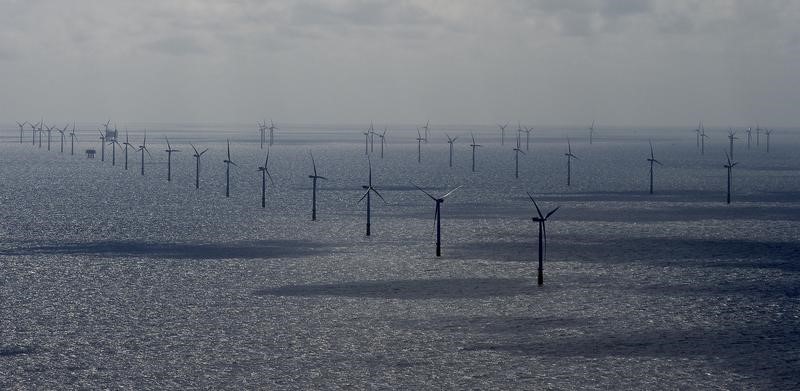Gold prices set for weekly gains on dovish Fed outlook; silver near record high
By Robert-Jan Bartunek
BRUSSELS (Reuters) - Swedish power utility Vattenfall (VATN.UL) said the falling cost of electricity from offshore wind farms will stimulate demand in Europe for more such farms, the head of the company's wind business said on Thursday.
Earlier this month Vattenfall won a 600 megawatt capacity offshore wind farm at Kriegers Flak in the Baltic Sea with a winning bid to produce electricity for a price of 49.9 euros per megawatt hour (MWh).
This came four months after Danish rival Dong Energy (CO:DENERG) won a Dutch project for a price of 72.2 euros/MWh in what was hailed as a breakthrough by the industry, and the 103 euros/MWh achieved by Vattenfall's win of the Horns Rev 3 tender in Denmark last year.
"With prices coming down, such as at Kriegers Flak, you are triggering the debate about more offshore," Senior Vice President Gunnar Groebler told Reuters.
He stressed that the low price at Kriegers Flak was still at a level at which the company could make a "healthy margin", and said he saw prices stabilising in the medium term.
Groebler said higher prices might still be seen at sites where weather and geological conditions are difficult.
While some rivals have looked to markets beyond Europe, he said the utility's focus was still on the continent for the 5 billion euros it plans to invest in renewable energy by 2020, as part of its move to carbon-free generation.
"We've got our plate full in Europe," he said. "The war chest allows for more to come."
Vattenfall is in the running for a tender at the Dutch offshore site in the Netherlands, at Borselle 3 and 4, to be decided by the end of the year.
Groebler added that future European investments would include onshore wind power and rebuilding at existing site with higher capacity at existing sites, such as Klim Fjordeholme in Denmark or Wieringermeer in the Netherlands.
In Germany, he said demand for renewables was also unlikely to be diminished by the result of elections next year, which could see the right-wing Alternative for Germany (AfD) party gain ground.
Groebler said he saw no reason for the country to abandon its "Energiewende" policy of moving its energy supplies to more renewable power generation and away from the use of fossil and nuclear fuels.
"The fundamental public opinion on this subject is very strong," he said.
He also said it was right that EU regulators are planning to end the practise for new projects of giving market priority to electricity generated by wind farms and solar panels.
Groebler said this was a sign of the renewable energy industry maturing and becoming more competitive.
"We cannot be treated with subsidies forever. It just doesn't work," he said. "It's about creating a level playing field."
